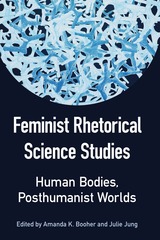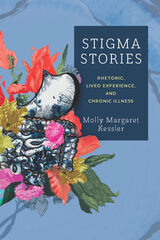2 books about Kessler, Molly Margaret

Feminist Rhetorical Science Studies
Human Bodies, Posthumanist Worlds
Edited by Amanda K. Booher and Julie Jung
Southern Illinois University Press, 2018
This edited collection disrupts tendencies in feminist science studies to dismiss rhetoric as having concern only for language, and it counters posthumanist theories that ignore human materialities and asymmetries of power as co-constituted with and through distinctions such as gender, sex, race, and ability. The eight essays of Feminist Rhetorical Science Studies: Human Bodies, Posthumanist Worlds model methodologies for doing feminist research in the rhetoric of science. Collectively they build innovative interdisciplinary bridges across the related but divergent fields of feminism, posthumanism, new materialism, and the rhetoric of science.
Each essay addresses a question: How can feminist rhetoricians of science engage responsibly with emerging theories of the posthuman? Some contributors respond with case studies in medical practice (fetal ultrasound; patient noncompliance), medical science (the neuroscience of sex differences), and health policy (drug trials of the U.S. Food and Drug Administration); others respond with a critical review of object-oriented ontology and a framework for researching women technical writers in the workplace. The contributed essays are in turn framed by a comprehensive introduction and a final chapter from the editors, who argue that a key contribution of feminist posthumanist rhetoric is that it rethinks the agencies of people, things, and practices in ways that can bring about more ethical human relations.
Individually the contributions offer as much variety as consensus on matters of methodology. Together they demonstrate how feminist posthumanist and materialist approaches to science expand our notions of what rhetoric is and does, yet they manage to do so without sacrificing what makes their inquiries distinctively rhetorical.
Each essay addresses a question: How can feminist rhetoricians of science engage responsibly with emerging theories of the posthuman? Some contributors respond with case studies in medical practice (fetal ultrasound; patient noncompliance), medical science (the neuroscience of sex differences), and health policy (drug trials of the U.S. Food and Drug Administration); others respond with a critical review of object-oriented ontology and a framework for researching women technical writers in the workplace. The contributed essays are in turn framed by a comprehensive introduction and a final chapter from the editors, who argue that a key contribution of feminist posthumanist rhetoric is that it rethinks the agencies of people, things, and practices in ways that can bring about more ethical human relations.
Individually the contributions offer as much variety as consensus on matters of methodology. Together they demonstrate how feminist posthumanist and materialist approaches to science expand our notions of what rhetoric is and does, yet they manage to do so without sacrificing what makes their inquiries distinctively rhetorical.
[more]

Stigma Stories
Rhetoric, Lived Experience, and Chronic Illness
Molly Margaret Kessler
The Ohio State University Press, 2022
In Stigma Stories: Rhetoric, Lived Experience, and Chronic Illness, Molly Margaret Kessler focuses on ostomies and gastrointestinal conditions to show how stigma is nearly as central to living with chronic conditions as the conditions themselves. Drawing on a multi-year study that includes participant observations, interviews, and rhetorical engagement with public health campaigns, blogs, social media posts, and news articles, Stigma Stories advocates for a rhetorical praxiographic approach that is attuned to the rhetorical processes, experiences, and practices in which stigma is enacted or countered.
Engaging interdisciplinary conversations from the rhetoric of health and medicine, disability studies, narrative medicine, and sociology, Kessler takes an innovative look at how stigma functions on individual, interpersonal, and societal levels. In doing so, Kessler reveals how stories and lived experiences have much to teach us not only about how stigma functions but also about how it can be dismantled.
[more]
READERS
Browse our collection.
PUBLISHERS
See BiblioVault's publisher services.
STUDENT SERVICES
Files for college accessibility offices.
UChicago Accessibility Resources
home | accessibility | search | about | contact us
BiblioVault ® 2001 - 2024
The University of Chicago Press









